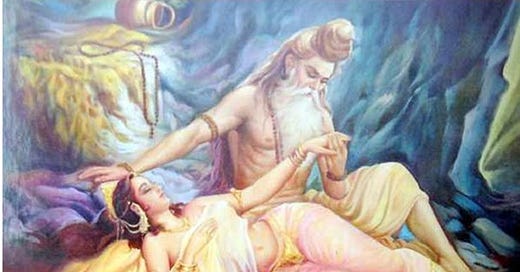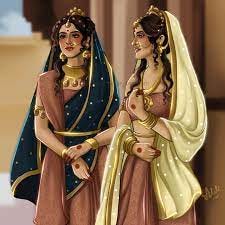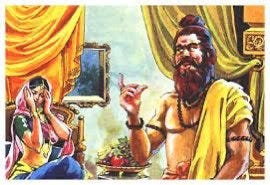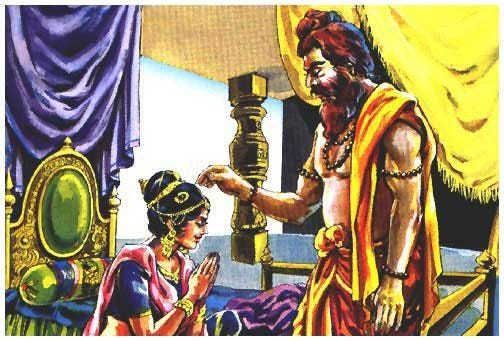Dear Readers,
In the previous story, I told you how Bhishma, the righteous offended Amba, the princess of Kashi. The result of this slighting was such that Amba ensured Bhishma’s doom. Bhishma’s vow was to stay away from every woman but a woman will become the reason for his destruction.
In the Vedic society, the feminine is Prakriti (nature/ cosmic elements) and the masculine is Purush (self/consciousness). The confluence of these two is manava (human being). Resultantly, a woman is symbolic of nature; benevolent, nurturing, and gentle but at the same time indomitable, fiery, and unconquerable. The story of Amba is the first incident in the Mahabharat which tells us of the apocalyptic results of offending women.
Bhishma slighted Amba and she ensured her revenge by becoming the reason for his inevitable death albeit in the next life. But what happened to her two sisters, Ambika and Ambalika?
This story is about the fate of those two other princesses.
Ambika and Ambalika were married to Prince Vichitravirya. But Vichitravirya’s lifestyle was such that he was not able to live long. Within a few months of marriage and before he could ascend the throne of Hastinapur, Vichitravirya died. The throne of Hastinapur was again left kingless and the two queens were left childless.
Queen Satyavati was perplexed. The responsibility of furthering King Shantanu’s lineage and ensuring the heir to the throne lay on her. She had to find a way to carry on the line of Kurus. Desperate to beget a grandson, Satyavati went to Bhishma and requested him to bed the two princesses so that they may bear the children of Kurus.
The righteous Bhishma was appalled by his stepmother’s request. He told her that he will not break his vow of celibacy for any reason. Satyavati argued that Bhishma could break the vow since he had taken it on her account. As she was the one requesting him Bhishma should break the vow to fulfill her wishes. But a staunch Bhishma firmly denied her requests.
Finding no other way, Satyavati called upon her son Krishna Dwaipayana. She had begotten him from her tryst with Sage Parasara (For the full story, refer to Episode 5). Krishna Dwaipayana was now known as VedVyasa for he had studied and compiled the four vedas which formed the basis of Vedic society.
Upon Satyavati’s call, VedVyasa arrived in Hastinapur. He bowed in front of his mother and asked her reasons for calling him. Satyavati told him of her dilemma. She requested VedVyas to make love to her daughters-in-law so that they may be blessed with intelligent children who will rule the kingdom of Hastinapur.
One may ask how would the children born of VedVyas and Princesses become the rulers of Hastinapur as they will not be of Kuru bloodline. This was possible under the law of Niyoga. Niyoga dictated that a woman can beget children from another man if her husband had died without fathering any children or her husband is unable to produce children. These children, although born through another man, were considered of the woman’s husband’s family. The technique was quite similar to what we now call Artificial Insemination.
This is what Satyavati requested Ved Vyas. VedVyas considered her request and realized that for the greater good of the people of Hastinapur, this was the only way. He agreed to his mother’s request but asked for some time to adjust his appearance. Years of penance and meditation in the forest had matted his hair and beard. He was concerned that his appearance would scare the young princesses. But Satyavati was impatient. She told VedVyas to go into the princesses’ bedchambers as he is.
Ved Vyas first entered Ambika’s chamber. The young princess was terrified of his looks. She closed her eyes and kept them closed throughout the time VedVyas was in her chamber. Vyas walked out of her chamber and told Satyavati that Ambika’s son will be blind since she had kept her eyes closed.
Next, Vyas went to see Ambalika. The young princess turned pale on seeing Vyasa. When Vyasa walked out of her chamber, he told Satyavati that the son born to Ambalika would be pale and weak in health.
Disappointed by the news of weak grandsons, Satyavati forced Ved Vyasa to return to Ambika’s room ordering her to make sure she doesn’t close her eyes and receive Vyasa with happiness. Ambika was not ready to go through such an ordeal again. She sent her maid instead to sleep on her bed. When Vyasa entered Ambika’s chambers, he met the maid who embraced Vyasa with open arms and made love to him fiercely. Vyasa was satisfied and told her that the maid will give birth to a son who would be healthy and intelligent.
In time, the three women gave birth to three sons. Ambika’s son was extremely healthy. He was touted to have the strength of hundred elephants but he was blind. He was named Dhritrashtra. Ambalika’s son was fair and intelligent but was pale and weak. He was named Pandu. Ambika’s maid begot a beautiful and intelligent son who was healthy and absolutely fit to be a king. He was named Vidura but since he was a maid’s son, he was not accepted as a royal prince.
And so, the two princesses earned their places in the Kuru household by giving birth to sons. But this is where the roles of Ambika and Ambalika end.
Where Amba establishes herself as an important character, Ambika and Ambalika become a victim of power politics and are left as mere instruments to gain heirs. On the other hand, we see how Satyavati was turning into a matriarch of the Kuru family. The only person to challenge her decisions in any way was Bhishma. He would also not challenge her word unless it meant breaking his vow or doing something which is against the law or tradition of the land.
But the highlight of this story for me was the concept of Niyoga. Etymologically, it means to perform a sexual act without any emotional attachment, purely for producing a child. I can see why this practice was laudable. It allowed widowed women or infertile couples to beget children without the taint of shame. But at the same time, there is a downside to it. Young widows like Ambika and Ambalika were not given a choice. They could have chosen a man of their choice to perform this act with. But Satyavati forces them to perform it with Vyasa because she wants the children to be fathered by someone from the family even if it is her illegitimate son.
I believe that the reason for the weaknesses in Satyavati’s grandsons is the fact that their mothers were never given a choice. Ambika and Ambalika must have a little bit of resentment towards their children for they had been forced to give birth to these children.






